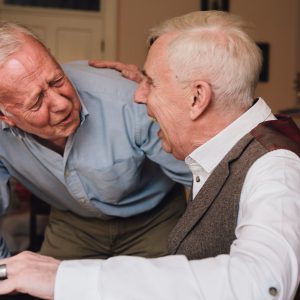Friend Power: The Value Of Friendships For Older Isolated Adults And Those With Dementia By Hope Reiner

Friend Power: The Value Of Friendships For Older Isolated Adults And Those With Dementia By Hope Reiner
July 24, 2019
by Hope Reiner, Founder, Hope and I
Few would disagree that our sense of community is undergoing a revolution. Our culture leads us to focus on what websites or news blogs we read, what social media platforms we are part of, and which celebrities we follow. But it does not inspire us to consider how to establish and nurture caring close relationships in today’s new “communities.” This takes not only an emotional toll on our lives but a physical one too.
There’s ample evidence that with the changing nature of our relationships people feel more isolated. In the 1980s, 20% of Americans said they were lonely. Now it’s up to 40%. As we grow older, we lose lifelong friendships because of illness and death, or loved ones moving away. Likewise, children leave the nest or start their own families, sometimes in other states or countries. Social isolation is often the result of these changes and it can bring devastating consequences. As former Surgeon General Vivek Murthy summarized from his experiences as a doctor in the Harvard Business Review: “The most common pathology I saw was not heart disease or diabetes; it was loneliness.”
Over the past 30 years, in my work as a Certified Geriatric Care Manager and Dementia Practitioner, and as the founder of Hope and I, I have helped dozens and dozens of people experience deep connection and genuine friendship regardless of their dementia, isolation or limitations. I call what I do Friend Power: When surrounded by friends who see us, understand us, elevate us, and support us, individuals can feel like anything is possible. A sense of community and the feeling of belonging are indispensable elements in the bigger picture of whole body health. For older adults who are alone, having a true friend can make an astonishing difference. And for me, working with people with dementia and creating an authentic friendship with each of them has forced me to listen and to slow down. It is a gift to both of us in the friendship.
What do genuine friendship and authentic connection provide to the clients with whom I work? Here are just a few of the benefits:
– Increase the sense of belonging and purpose
– Boost happiness and reduce stress
– Improve self-confidence and a sense of self-worth
– Help cope with traumas, serious illness, or death of a loved one
– Encouragement to change or avoid unhealthy lifestyle habits
And here’s an example of a friendship I formed that benefited both the client and me:
Client C was 98 when I began working with her. She had begun to withdraw from life years before, and in her isolation, she developed dementia. By the time I met her, she had full-time aides and a variety of other professionals in her life—geriatric care managers, bill payers, trustees, and occupational therapists. She had occasional visits from members of her church. She received wonderful care and was able to get around for short distances with the help of her aide and her walker. But she had no friends in her life.
I forged a loving friendship with her and have been seeing her every week for 3 years. She is now 101. What she began to do as a result of our friendship was to speak coherently, laugh and joke, and to even give me advice about my own life!
Every day there seems to be more evidence-based science which shows that cognition can improve under the right circumstance for older adults, even those with dementia. We need to truly “see” and then engage with them; slow down and show compassion and understanding. We need to provide genuine caring and authentic friendship, particularly to the neediest, including older isolated adults and people dealing with dementia in its various forms. I’ve seen miraculous changes in clients with whom I’ve developed close, loving relationships. Friend Power is real and it’s available to all of us if we just take the time and make the effort.
Hope Reiner, the Founder of Hope & I, has over 30 years of experience working with older adults. She is a Certified Geriatric Care Manager, Certified Dementia Practitioner, and the author of “Friend Power” from the book Social Isolation of Older Adults: Strategies to Bolster Health and Well-Being, published by Springer Publishing Company (2018). Her approach to one-on-one work with older adults and special needs persons is reinforced by scientific research about the essential need for loving connection, stimulation, engagement and interaction in one’s life. For further information about her work, Hope can be reached at [email protected].







